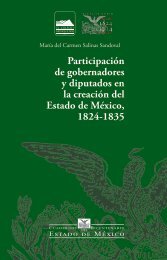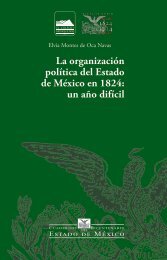You also want an ePaper? Increase the reach of your titles
YUMPU automatically turns print PDFs into web optimized ePapers that Google loves.
KORPUS <strong>21</strong>, VOL. 2, NÚM. 4, 20<strong>21</strong>, 201-<strong>21</strong>8<br />
Despite feminist protests to the contrary,<br />
both the Mexican press and the Marxist left<br />
persistently framed a zero-sum tradeoff<br />
between sexual rights and human rights<br />
(Wilson, 2002). This Manichean reading<br />
ascribed meaning to every political performance,<br />
forcing participants to demonstrate<br />
their political bona fides to their ideological<br />
allies while deepening the purported divide<br />
between the two camps. The lesbian forum<br />
where Cárdenas spoke vacated the meeting<br />
room in time for it to be used by a group<br />
calling itself “Mujeres Demócratas Chilenas”.<br />
The audience had listened in stunned<br />
and respectful silence as three women recounted<br />
their experiences of detention and<br />
torture under Pinochet. Afterwards, a coalition<br />
of left-leaning organizations invited<br />
attendees to a counter-conference at the<br />
Hidalgo Theater on Mexico City’s historic<br />
Alameda Central, to prevent “the themes of<br />
lesbianism and prostitution distracting from<br />
questions of importance and transcendence”<br />
(AGN, 1975e).<br />
Roughly, a thousand people gathered for<br />
this anti-Pinochet rally featuring speeches<br />
by communist leaders such as the Soviet<br />
cosmonaut Valentina Tereshkova, the Cuban<br />
revolutionary Vilma Espín, and Salvador<br />
Allende’s widow, Hortensia Bussi de Allende,<br />
punctuated by chants of “El pueblo unido<br />
jamás sera vencido” and ending with a<br />
rousing chorus of the International (AGN,<br />
1975f).<br />
Simultaneously, a group of young leftists<br />
from the Movimiento Liberación de la Mujer,<br />
Grupo Leninista Feminil, the Liga Socialista,<br />
and a Communist student organization Grupo<br />
Comunista Internacionalista staged another<br />
demonstration across town in the Casa<br />
<strong>del</strong> Lago, the UNAM-run cultural center in<br />
Mexico City’s picturesque Bosque de Chapultepec<br />
(AGN, 1975g, 1975h y 1975i). Activists<br />
would have had to choose whether to<br />
join the anti-Pinochet rally or to join the 700<br />
or so young people demanding twenty-fourhour<br />
childcare facilities, collective kitchens<br />
and laundries, the socialization of housework<br />
through a domestic wage, and –above all–<br />
free and legal access to abortion. The Mexican<br />
press was unsparing in its comparison<br />
of these two demonstrations. In contrast to<br />
its reverent article about the anti-Pinochet<br />
rally, El Universal’s article about the student<br />
demonstration stressed only their youth and<br />
inexperience, depicting them as children<br />
playing revolutionary games. “Beneath a benign<br />
sun, girls [niñas] –their voices as sharp<br />
as their proposals were radical– spoke of the<br />
exploitation of women in the capitalist system<br />
and the need to unite with the proletarian<br />
struggle”, the paper reported. The article<br />
mocked the students’ ratty jeans –“worn<br />
with pride because there is no more revolutionary<br />
touch than a ‘humble’ outfit”– as well<br />
as their speeches. Describing the protesters<br />
as “false-sounding” and “as insipid as they<br />
were ill-informed”, the El Universal reporter<br />
sneered:<br />
The youngsters [jovencitas], trying to give a<br />
grandiose tone to their discourse, with so little<br />
originality given their canned and dogmatic<br />
repetition and insistence on philosophical<br />
concepts that have become linguistic jargon,<br />
took a stand for the “socialization of domestic<br />
labor”. Saying that staging a revolution every<br />
Sunday had become a fad at Casa <strong>del</strong> Lago,<br />
the article concluded dismissively that “the<br />
representatives of feminist organizations –<br />
so few that they seem spectral” had staged<br />
a “festival in which the disoriented nonconformists<br />
let loose with their urban hysteria”<br />
(Anonymous, 1975g: 10).<br />
A few days later, international crowds<br />
dissipated just as they had arrived. Attorney<br />
General Ojeda Paullada dropped the final<br />
gavel on the intergovernmental conference,<br />
proclaiming it a triumph despite deep divisions<br />
over Zionism and a refusal to include<br />
“sexism” among the obstacles to women’s<br />
emancipation. At the NGO tribune, a mariachi<br />
band struck up, giving a celebratory feel<br />
to the closing session while also drowning<br />
out a group of rural women from Guerrero<br />
who attempted to denounce military repression<br />
in their communities (AGN, 1975j).<br />
<strong>21</strong>1



![bicentenario_1[V2]](https://img.yumpu.com/68677971/1/167x260/bicentenario-1v2.jpg?quality=85)









![El_primer_federalismoEM[final]_compressed (2)](https://img.yumpu.com/68483279/1/178x260/el-primer-federalismoemfinal-compressed-2.jpg?quality=85)



